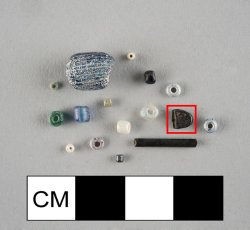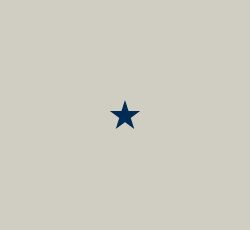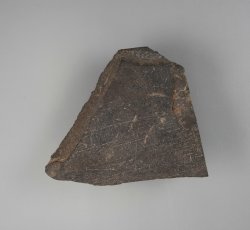House for Families - Page 13 of 18

Drawn, simple, sub-spherical, clear seed bead
Glass | Object #: 1829938
Kidd and Kidd type IIa; iridescent patina that is transparent when wet.
Explore This Item
Drawn, simple, barrel-shaped, blue seed-bead
Glass | Object #: 1829939
Kidd and Kidd type IIa; silvery patina that becomes transparent when wet. Viewed with OMAX 4/0.1 160/0.17
Explore This Item
Drawn, simple, barrel-shaped, green seed bead
Glass | Object #: 1829942
Kidd and Kidd type IIa; little patina, what is there appears white.
Explore This Item
Drawn, simple, barrel-shaped, light green seed bead
Glass | Object #: 1829945
Kidd and Kidd type IIa; thin white patina covering the bead, with the light green glass still visible through; on the perforation sides, a yellowish-brown patina has appeared. Viewed under OMAX 4/0.1 160/.017
Explore This Item
Drawn, simple, sub-spherical, blue, seed bead
Glass | Object #: 1829948
Kidd and Kidd type IIa; silvery patina, thick; patina becomes transparent when wet and blue glass very visible. Viewed under OMAX 4/0.1 160/0.17
Explore This Item
Drawn, simple, sub-spherical, red seed bead
Glass | Object #: 1829949
Kidd and Kidd type IIa; red color completely obscured by white-silvery patina. When wet, the bead appears brownish-red to the eye. When wet and placed under the microscope (OMAX 4/0.1 160/0.17), it shows to be a brighter red in color.
Explore This Item
Drawn, simple, barrel-shaped white seed bead with clear casing
Glass | Object #: 1829950
Kidd and Kidd type IIa; little to no patina. Casing visible by the naked eye, and confirmed under the microscope OMAX 4/0.1 160/0.17
Explore This Item
Drawn, simple, sub-spherical, white seed bead
Glass | Object #: 1830032
Kidd and Kidd type IIa; little to no patina
Explore This Item
Black, ovular, unidentified object with possible double perforation, flat sides.
Glass | Object #: 1830045
Kidd type unknown due to distorted shape; original shape type and manu tech also indeterminate. Little to no patina.
Explore This Item
Quartz oil stone.
Quartz | Object #: 1830086
Possibly similar to "Turkey Oyl Stone" Washington orders in 1759. Oil stones are whetstones, used for sharpening or honing, novaculite-rich from area of Ottoman empire http://www.popularwoodworking.com/article/what-is-an-oilstone-2. Appears broken along 3 faces with 3 original faces. ...
Explore This Item
Sandstone whetstone.
Sandstone | Object #: 1830101
Concave sides from excessive use of sharpening many tools. Thin groove along one face for the sharpening of a tool. Iron corrosion surrounding groove. Appears similar to Aquia sandstone quarried locally for Mansion foundation and early outbuildings on the estate.
Explore This Item
Strip of lead shot gang mold sprue.
Lead | Object #: 1830464
This artifact is a strip of lead sprue waste, related to the production of gang molded lead shot. Some shot molds were capable of casting a single ball, and others, called gang molds, were capable of casting several shot all at once. In this latter type, molten lead was poured into the top of t...
Explore This Item
Possible large misshapen, cast lead shot
Lead | Object #: 1832393
This artifact is a fragment of lead, possibly related to the production of molded lead shot. Some shot molds were capable of casting a single ball, and others, called gang molds, were capable of casting several shot all at once. Regardless of type, molten lead was poured into the top of the mol...
Explore This Item
Cut slate with marks.
Slate | Object #: 1832403
Uniform in profile, appears to retain 1 (possibly 2) original edges. One face has 1 X and a series of parallel lines cutting faintly into the surface. Possibly from use as architectural material, or possibly re-purposed as writing surface.
Explore This Item
D-shape iron utilitarian buckle frame.
Iron | Object #: 1832972
In poor condition. Missing tongue. D-shape single frame iron util. buckle. May have once had plate- pin has piece of metal looped around frame that may have once connected body of plate to buckle.
Explore This Item
2 piece convex bone button back fragment with 2 visible eyes.
Bone | Object #: 1833384
Bone button molds were disks cut from animal bone, often identifiable by the presence of a single central hole created by a cutting tool during production. The bone disk often served as the back of a two part button. In this button form, the face of the button was commonly comprised of a stampe...
Explore This Item
Large cast lead shot with visible stem.
Lead | Object #: 1833466
This lead ball is a piece of shot. This particular shot was formed in a mold, which was usually made of metal with two halves hinged together. Molten lead was poured into the top of the mold and traveled along a narrow channel to a spherical casting chamber. Some shot molds were capable of cast...
Explore This Item
Small cast lead shot with visible seam
Lead | Object #: 1833468
This lead ball is a piece of shot. This particular shot was formed in a mold, which was usually made of two halves hinged together. Molten lead was poured into the top of the mold and traveled along a narrow channel to a spherical casting chamber. Some shot molds were capable of casting a singl...
Explore This Item
Large cast lead shot with visible stem and seam
Lead | Object #: 1833488
This lead ball is a piece of shot. This particular shot was formed in a mold, which was usually made of metal with two halves hinged together. Molten lead was poured into the top of the mold and traveled along a narrow channel to a spherical casting chamber. Some shot molds were capable of cast...
Explore This Item
Small dropped lead shot with visible dimple.
Lead | Object #: 1833500
This lead ball is a piece of shot. This small sized shot was manufactured by a technique invented by Prince Rupert in the seventeenth century. In this process, molten lead fluxed with arsenic is poured over coals in a colander like instrument which in turn is set above a barrel of water which c...
Explore This Item